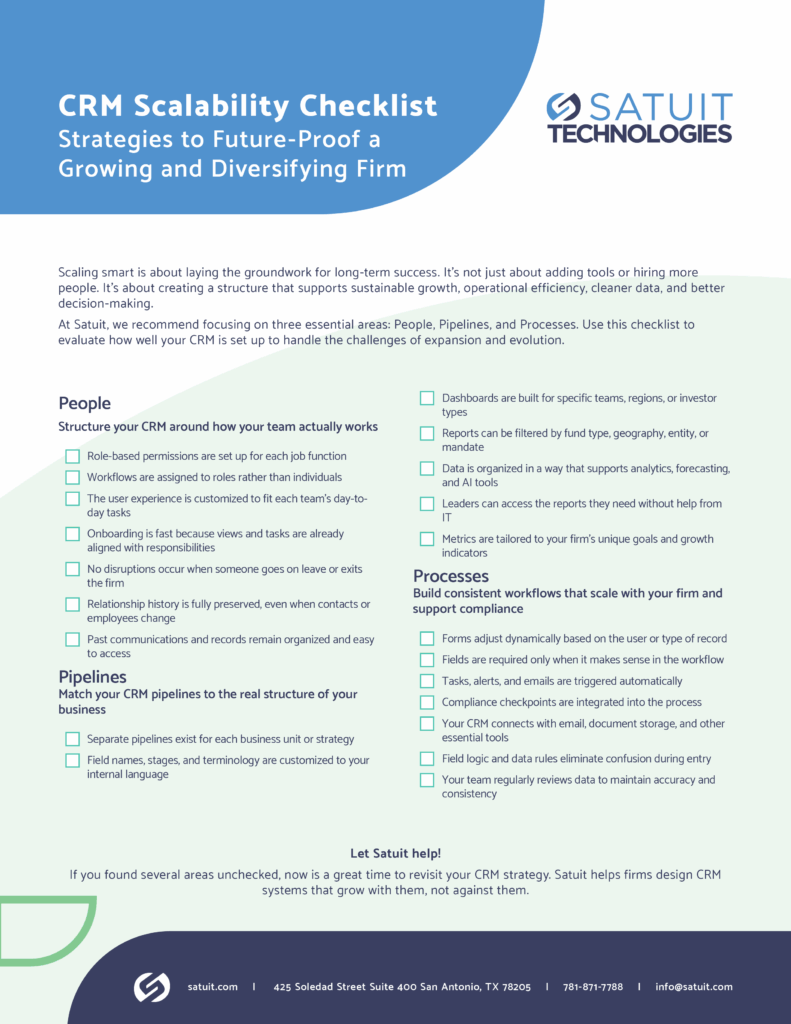James Plassmann, Senior Vice President of Client Success at Satuit Technologies, explains how success in asset management can depend on industry specific CRM tools that foster firm-wide collaboration and provide a broader view of client relationships.
In asset management, relationships are key but keeping track of contacts across multiple networks – and understanding what’s going on – can be challenging. Asset and wealth management relationship managers need to be able to organize client data, identify actionable insights, track opportunities, and manage investor data from any location.
What Do Industry Specific CRMs Bring to the Table?
As the financial industry advances on its journey towards digitalization, it is becoming increasingly difficult and time-consuming to sort through the growing volumes of data. It can also be difficult to ensure your entire team is on the same page. Which clients have been spoken to and by whom? And are they delivering a consistent message?
With so much communication taking place and information being exchanged between team members and their clients, and with each other, it is vital for the firm to gain a broader view of its relationships, rather than viewing individual contacts in isolation. A company-wide CRM platform is the foundation for managing client relationships, and prioritizing their interests and needs, cohesively – providing that informative 360-degree view. But non-industry specific CRM platforms will only take you so far, limiting opportunities for success.
To achieve their full potential, asset management and wealth management firms require a purpose-built CRM system designed with the complex relationship management needs of the investment managers in mind, including the ability to support compliance with ever-changing regulations and shifts in market structure. The CRM must also be highly configurable to the needs of individual firms so that it increases workflow efficiency and fosters collaboration within and across teams.
Enhance Consultant Relationships
To illustrate why a specialist CRM is so important for the asset management industry, let’s consider relationships with the consulting community. Managing and tracking interactions with consultants is both integral and challenging.
These gatekeepers for business development have a significant influence on client retention, and constantly evaluate fund managers’ products, in conversations and meetings, both formal and informal, and by collecting data on fund performance and strategy.
Managing a consultant opportunity can be difficult because it may start off as a ‘blind’ opportunity with the consultant, before progressing to the actual investor. Industry specific CRMs enable users to track the opportunity once the investor is identified and provide an understanding of which opportunities were and were not successful – pivotal for future engagements with each consultant.
Track Consultant Ratings and Activities
The right CRM understands investment managers need to be able to track the ratings a consultant assigns to their individual products or funds, and changes to those ratings. A purpose-built CRM provides the ability to record interactions with consultant firms, the products discussed, and report on who has previously engaged with them. As consultants change firms, it is important to be able to track their activities as they move around, while maintaining access to historical activity with former employers. Specialist CRM platforms provide full transparency into the entire consultant organization, enabling firms to manage their consultant relationships successfully.
Maximizing Asset Management Sales Potential
As we in the industry know, the asset management sales process is complex and can be frustrating, and both the process and its outcomes are not completely under the control of the sales rep or sales manager. Asset management CRMs support the sales process by helping reps better manage their time and focus, through specialized metrics to better evaluate and develop the team’s sales efforts and streamline management reporting.
There is a direct correlation between strong sales processes and managers who are data-driven, so it is important to lead by example and ensure you are actively using the CRM – to get up-to-date snapshots of the sales pipeline, see how opportunities are progressing, and monitor recent activity.
If your sales and consulting teams haven’t reached their full potential yet, it’s probably time to take another look at your CRM.
View our blog on selecting the right buy-side CRM for your firm to learn how to select the right industry specific CRM.
Industry-Specific Software for Buy Side Firms
At Satuit we offer a suite of software products for buy side firms. Our industry specific CRM platform, developed by experienced investment professionals can be installed as a cloud solution or onto existing servers.
We additionally offer a secure investor portal for an all-in-one document management tool for investor communication and a client report automation software that simplifies client reporting. Easily integrate our various products with existing systems with our secure data exchange.
To learn more about Satuit’s industry specific CRM, reporting, and portal software solutions for asset management, hedge fund, wealth management, private equity, and real estate markets, contact us today.






